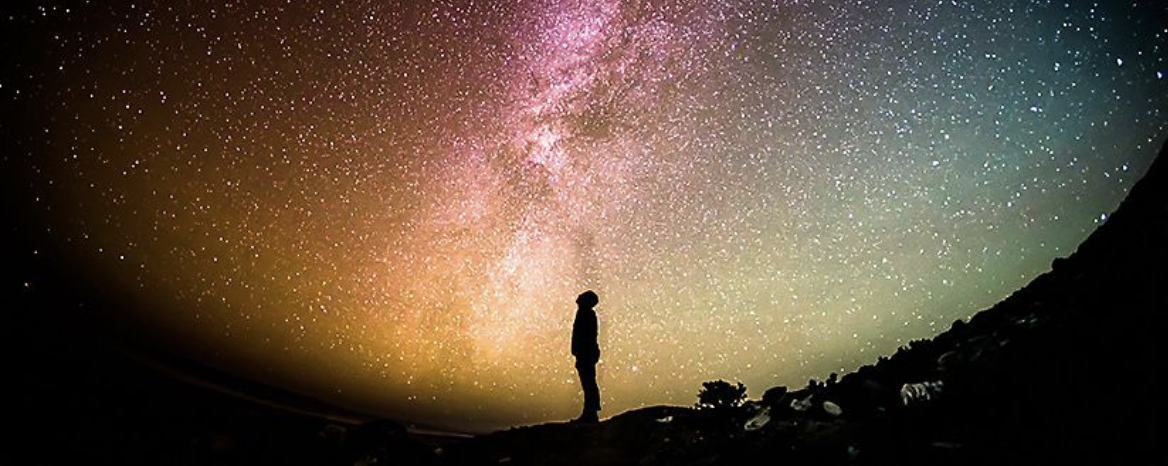With the rise of secularism and the new atheism, the existence of God is often called into question. Naturalists have asserted that God does not exist. Once they remove God from the equation, alternative explanations had to be formulated for the origin of the universe as well as for the existence of order and design in the universe. Using the Kalām cosmological argument and the teleological argument, I will make a case for the universe having a beginning and that it was caused by an uncaused, external personal agent, namely God who is also responsible for the order and design we observe in the universe. For beside Him there is no plausible explanation for the origin of the universe and the order within. Consequently, believing in God is a rational position.
The Kalām Cosmological Argument
Kalām literally means ‘speech’ in Arabic. The Kalām cosmological argument was initially formulated by al-Ghāzalī as follows: “Every being which begins has a cause for its beginning; now, the world is a being which begins; therefore, it possesses a cause for its beginning”. R. C. Sproul argued that: “Everything in time and space had a beginning…You can’t get something from nothing. An absolute law of science and logic is ex nihilo nihil fit (out of nothing, nothing comes)”. The notion “beginning to exist” implies that anything that falls in that category is not eternal. Their coming to existence is in fact an effect. And for every effect there needs to be a cause.
William L. Craig posits that : “ To suggest that that things could just pop into being uncaused or out of nothing is to quit doing serious metaphysics and to resort to magic”. Both metaphysical intuition and human experience confirm that things come to exist because they are caused. If that is not the case, anything could just pop into existence without any explanation whatsoever. But this has never been empirically proven so far. Thus, the causal principle is necessary to explain the reality of things that begin to exist.
It is metaphysically absurd to believe that the universe came to exist, uncaused, out of nothing, for the simple fact that “being” cannot come from “non-being”. Thus, something cannot come to exist uncaused out of nothing. The causal principle applies to all of reality. L. Russ Bush beautifully stated : “If the universe, then, can be properly described as in any sense an effect, rational thought about this fact would demand (as a necessary rather than a merely probable conclusion) that there must be a first, original uncaused cause”.
R. C. Sproul, Essential Truth of the Christian Faith (Carol Stream, IL: Tyndale, 1992), 61.
William Lane Craig, Reasonable Faith: Christian Truth and Apologetics (Wheaton, IL: Crossway, 2008), 111.
L. Russ Bush, A Handbook for Christian Philosophy, (Michigan; Zondervan, 1991), p. 108.
Some arguments against the universe having a beginning have been proposed. One of them is the theory that views the universe as being eternal meaning with no beginning or end. New matter is generated ex nihilo into the voids created by the galactic recession.
There is evidence that the universe is slowly running out of its usable energy. It is described as a state of equilibrium where the universe will not have enough energy for its operations. That’s the second law of thermodynamics. It is logical to believe that something that is diminishing must have had a starting point where it was in sufficient quantity, all other things remaining equal. If the energy that the universe had at a certain moment is diminishing, it cannot be argued that the universe is eternal; if it were, the second law of thermodynamics would be falsified. But that is not the case, as we should have already reached equilibrium if the universe is eternal; We have not, so the universe is not eternal. Besides, discoveries have portrayed a universe which is not eternal, but rather, came to exist at an initial cosmological singularity event called the Big Bang”. In this Big Bang, energy, space, and time all came to existence. Nothing existed before that singularity when the universe came into existence, thus justifying creation ex nihilo.
The Teleological Argument
The Teleological argument or argument from design argues for the existence of an intelligent designer considering the fine-tuning as well as the complexities of a DNA cell.
The fine-tuning refers to the calibration of actual values of constants and quantities in the universe which makes life possible. William L. Craig argues that “in the absence of fine-tuning, not even atomic matter or chemistry would exist, not to speak of planets where life might evolve”. One may argue against the evidence of the fine-tuning but nevertheless, it is the only option for life to be possible in the universe. Even scientists that do not believe in God have to acknowledge the fine-tuning because it is self-evident. While the fine-tuning is undeniable, some cosmologists arguing against the design argument have resorted that it may be the result of physical necessity or chance.
On the matter of physical necessity, William L. Craig posits that it is extraordinary implausible because it requires us to believe that a life-prohibiting universe is virtually physically impossible. But surely, it does seem possible. As far as chance is concerned, the enormous, specified improbability of a life-permitting universe presents a hurdle for the chance hypothesis. Dinesh D’Souza argues that: “In order for life to exist, the gravitational force must be precisely what it is. The Big Bang had to occur exactly when it did. If the basic values and relationships of nature were even slightly different, our universe would not exist, and neither would we”. It is absurd to approach such precision or attention to details with an argument based on chance. The order in the universe is one thing, the complexity of a DNA molecule is another argument in favor of the argument by design. A single DNA molecule contains as much information as one volume of an encyclopedia. It would not make sense to consider an encyclopedia resulting from chance and not intelligence. In the same token, it is rational to believe that the complexity of the universe and the DNA is the result of an intelligent cause.
William Lane Craig, Reasonable Faith: Christian Truth and Apologetics (Wheaton, IL: Crossway, 2008), 161.
Ibid.,161
Dinesh D’Souza. What’s So Great About Christianity. (Carol Stream. IL; Tyndale, 2017), p.138.
Conclusion
Considering the two arguments developed earlier, it can be stated that we have good reasons to believe that the universe was caused into existence. Since time and space began as objective realities, the causal agent of the universe must be beyond space and time as well. Therefore, the cause for the universe coming to must be outside of the universe itself. In other words, it has to be a transcendent cause. The order and complexity we observe in the universe appeal for an intelligent designer who must be all-powerful and all-knowing. No being inside the universe matches such a description. It is only applicable to the being that is called God. Therefore, it is reasonable to believe that God is the creator of the universe. Believing in God is is a rational position if we want to explain the origin, the fine-tuning and the complexity of the universe.
Bibliography
- William Lane Craig, Reasonable Faith: Christian Truth and Apologetics (Wheaton, IL: Crossway, 2008)
- Erwin W. Lutzer, Seven Reasons Why You Can Trust Your Bible (Chicago: Moody Publishers, 2008)
- Dinesh D’Souza. What’s So Great About Christianity. (Carol Stream. IL; Tyndale, 2017)
- L. Russ Bush, A Handbook for Christian Philosophy, (Michigan; Zondervan, 1991)






